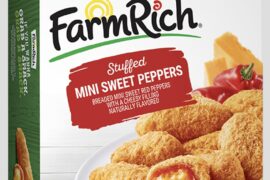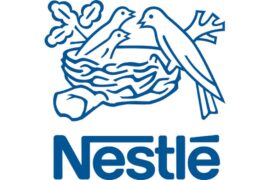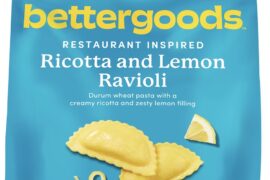Private label is out and a heightened emphasis on enhancing the profile and sale of name brand products is in at ConAgra Foods. The Omaha, Nebraska, USA-headquartered company announced during a June 30 earnings conference call that it plans to divest its store brands unit, which was acquired from Ralcorp for approximately $4.95 billion in 2013.
Accounting for approximately one-fourth of ConAgra’s current revenues, the private label division reportedly lost almost $400 million during the past year. In the fourth quarter of 2015, which ended on May 31, it posted an operating loss of $25 million on sales of $1 billion. Higher commodity costs and lower volumes were cited as the reason for the downturn.
ConAgra CEO Sean Connolly, who took assumed the helm in April following the departure of Gary M. Rodkin, commented: “As I have intensely studied the situation in our private brands operations over the last few months, it has become clear that the time and energy the company is devoting to the private brands turnaround represent a sub-optimal use of our resources. To prevent further distraction, we are pursuing the divestiture of our private brands operations. Because the outcome of our strategic review for the private brands operations will influence our long-term financial outlook, we will wait until this process is complete before sharing long-term financial commitments. We expect to offer operating details of our plans as well as long-term financial expectations at an investor event later this year.”
Brand and Commercial Sales Rise
Branded products in the consumer segment, which include a raft of retail frozen food offerings well known to American consumers, rang up a 4% sales increase to $1.9 billion and an operating profit of $304 million in Q4.
The commercial foods segment also fared well, with both revenue and volume climbing approximately 7% on sales of $1.2 million. The result was an operating profit of $154 million.
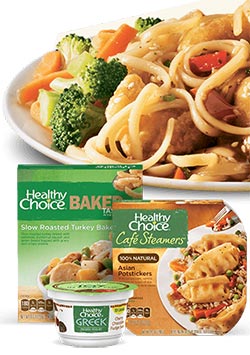 Connolly, who previously headed up Hillshire Brands and supervised its sale to Tyson in 2014, highlighted the improved performances of name brand products, including Healthy Choice and Banquet frozen ready meals. In fact, he voiced enthusiasm for certain segments of the frozen food category, as evidenced by the company’s recent purchase of Blake’s All Natural Foods, a maker of natural and organic pot pies, casseroles, pasta dishes and other entrees.
Connolly, who previously headed up Hillshire Brands and supervised its sale to Tyson in 2014, highlighted the improved performances of name brand products, including Healthy Choice and Banquet frozen ready meals. In fact, he voiced enthusiasm for certain segments of the frozen food category, as evidenced by the company’s recent purchase of Blake’s All Natural Foods, a maker of natural and organic pot pies, casseroles, pasta dishes and other entrees.
Eric Kartzman of Deutsche Bank put this question to the chief executive officer during the earnings conference call: “It seems like frozen entrees is the one category since the Great Recession that has been in serious decline, and that’s a very big part of the consumer portfolio. Is there something that you see within those brands and within frozen entrees where maybe the category has bottomed, or is there some technology that you see within the business today that makes you more comfortable that there can be a turn in what’s a very important part of the consumer segment?”
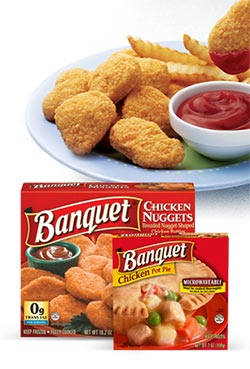 Connolly replied: “The key is the foods got to be good. So that’s why we have taken the actions we’ve taken in our business. Healthy Choice Café Steamers is a clearly superior product than what we sold under the Healthy Choice name previously. It is working, and now we are taking it to the next step with the clean label 100% natural line.”
Connolly replied: “The key is the foods got to be good. So that’s why we have taken the actions we’ve taken in our business. Healthy Choice Café Steamers is a clearly superior product than what we sold under the Healthy Choice name previously. It is working, and now we are taking it to the next step with the clean label 100% natural line.”
Similarly with the value tier Banquet brand, the company realized it needed to improve food quality.
“And that’s what we’ve done,” said Connolly. “These are the kind of fundamental actions that you need to take to improve performance. So it is not a question of is the world going to frozen, or is the world going to fresh. There clearly is room for both. Our idea is that we need to make frozen fresh and we need to bring fresh perspective in frozen, and that’s how you drive profitable growth.”
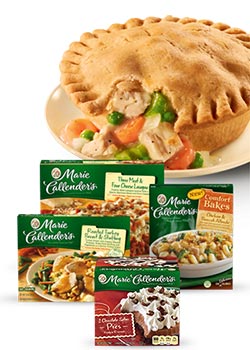 Elaborating on the potential for heating up sales of pot pies, a segment regarded by some as uninspiring, the ceo remarked: “I’d argue it’s a very exciting category. We’ve got the market-leading brand with Marie Callender’s, which is posting robust growth and has good margin. However, we also recognize we were not reaching all the consumers who are participating in that category because some have kind of what I’ll describe as a different value system around what kind of brands they appreciate. So we went out and we made the acquisition of Blake’s All Natural, which is also a pot pie where we got tremendous leverage in terms of our ability to manufacture, but it appeals to a different kind of consumer with a natural and organic kind of mindset, and that is incremental to the business we already on today.
Elaborating on the potential for heating up sales of pot pies, a segment regarded by some as uninspiring, the ceo remarked: “I’d argue it’s a very exciting category. We’ve got the market-leading brand with Marie Callender’s, which is posting robust growth and has good margin. However, we also recognize we were not reaching all the consumers who are participating in that category because some have kind of what I’ll describe as a different value system around what kind of brands they appreciate. So we went out and we made the acquisition of Blake’s All Natural, which is also a pot pie where we got tremendous leverage in terms of our ability to manufacture, but it appeals to a different kind of consumer with a natural and organic kind of mindset, and that is incremental to the business we already on today.
“So what’s different around the way we will approach these growth opportunities is effectively everything. We are going to pursue different work processes, we are going to have new capabilities.”
What’s Up with Jana?
It is believed that the recent acquisition of 7.2% of ConAgra stock (a $540 million stake of 31 million shares in the approximately $19 billion capitalized company) by activist investor Jana Partners will increase demand for capital allocation changes, as well as the seating of new board members.
According by analysis by Andrew Sebastian published at the Insider Monkey finance website (www.insidermonkey.com) on June 19: “Jana was moved to take a position after ConAgra took a $1.3 billion impairment charge related to its (Ralcorp) acquisition. Jana will likely push for the nomination of Barry Rosenstein (the hedge fund’s founder and manager), Brad Alford (former ceo of Nestle USA) and James Lawrence (former chairman of Rothschild and cfo of Unilever and General Mills) to ConAgra’s board with the hopes of driving change at the company and modifying ConAgra’s capital allocation policies.”
During the earnings call on June 30, analyst Ken Goldman of JPMoran asked about expectations for the outcome of meetings planned with Jana executives later in the week.
“We have not yet spoken with the folks at Jana,” said Connolly, “but clearly we welcome their feedback as we would with any of our shareholders who are focused on long-term value creation. I think that is common ground that we have with Jana and with other investors. I can’t offer anything specifically related to Jana other than to say we want a constructive engagement and we will listen to their point of view.”
Meanwhile, the ceo may have preempted the paramount concern of big and small shareholders by declaring that ConAgra will exit the private label business and sell off underperforming brands.
Lamb Weston Potato Sales Grow
As for the positive performance in the commercial foods segment, it was noted that Lamb Weston’s potato operations grew, although international sales were impacted by delayed shipments due to the US West Coast port labor dispute as well as challenges facing quick-serve customers the key Asian markets of Japan and China. The port issue was settled in late February of this year, and Lamb Weston’s international shipments have been gradually improving. The company expects to reach normal shipment levels in the first half of fiscal 2016. Sales for the rest of the segment increased as well.
After adjusting for items impacting comparability, current quarter operating profit increased 3%, reflecting the benefit of an extra week in the fourth quarter of fiscal 2015. Lamb Weston’s comparable profits grew modestly, largely reflecting a positive domestic performance and efficiencies from good raw potato crop quality. Profits for the rest of the businesses in the segment grew modestly.
At the close of New York Stock Exchange trading on July 1, ConAgra stock (NYSE: CAG) was priced at $44.60 a share, up 2.1%% from $43.72 the day before. Over the past 12 months the company’s stock has risen by over 21% in value. The adjusted fourth quarter profit was $0.59 per share, up 7% from the same period in 2014.
Bank of America Merrill Lynch analyst Bryan D. Spillane has upgraded ConAgra’s rating from Underperform to Neutral, while elevating the price target to $46 from $30. He believes that the company’s sharpened focus on cost savings should improve margins.
“Management unveiled its initial strategic base plan, which includes divesting its private brands business, costs savings, productivity initiatives, and driving growth in consumer foods and Lamb Weston,” he said.
[Editor’s note: FrozenFoodsBiz.com thanks Seeking Alpha for providing a transcript of ConAgra’s June 30 earnings conference call. Readers who want to review the full text may do so by visiting www.SeekingAlpha.com.]


